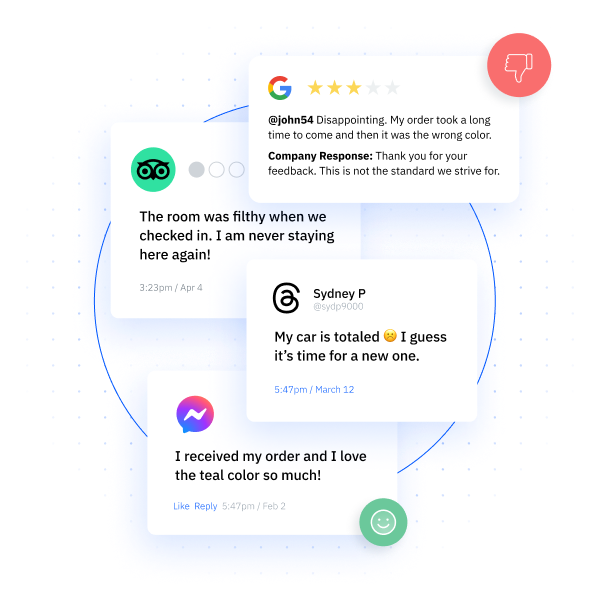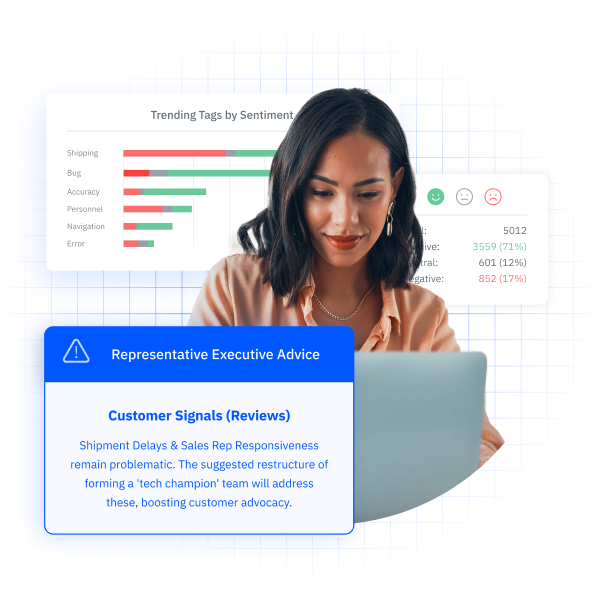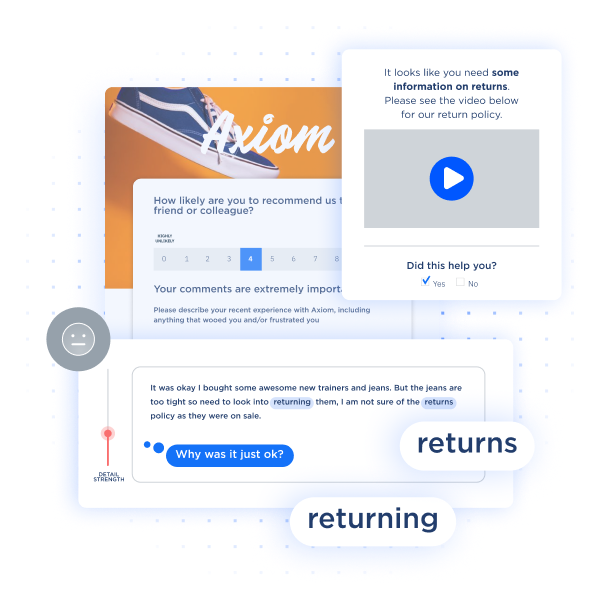Natural Language Processing: Transforming Large Data into Strategic Business Insights
Natural Language Processing (NLP) enables computers to understand and respond to human language. By analyzing unstructured data like emails, social media posts, and customer reviews, NLP helps businesses gain valuable insights and make informed decisions that drive growth and efficiency.
Natural Language Processing (NLP) is a complex, yet fascinating and rapidly evolving field. It combines the specialties of computer science, artificial intelligence, and linguistics. Merging all three disciplines, it focuses on the interaction between computers and humans through natural language. This enables machines to understand, interpret, and respond to human language in a way that is both meaningful and useful.
This technology supports a wide array of applications, from voice-activated assistants and chatbots to sophisticated text analysis tools and language translation services. By leveraging complex algorithms, machine learning techniques, and vast amounts of linguistic data, NLP aims to bridge the gap between human communication and computer understanding, transforming how we interact with technology in our daily lives. As the capabilities of NLP continue to expand, it further revolutionizes various industries, enhances user experiences, and opens new avenues for research and innovation.
What is Natural Language Processing?
Natural Language Processing, or NLP, is a part of computer science that helps computers understand, interpret, and use human language. Basically, it’s like teaching a computer how to talk and write like a human.
Imagine you’re talking to your friend, you can understand each other easily, right? But if you try to talk to a computer in the same way, it might get confused because it doesn’t understand things like jokes, sarcasm, or even some common phrases. Natural language processing tries to solve this problem. It’s like building a bridge between human language and computer language.
Natural Language Processing in AI
Natural language processing is a critical area of artificial intelligence. It allows computers to understand, interpret, and generate human languages. Therefore, enhancing the interactions between computers and humans to be useful and meaningful is crucial.
One of the most beneficial aspects of this interaction is how NLP can rapidly process and analyze vast amounts of data, far quicker than a person could. This accelerates data analysis, allowing us to concentrate on more important tasks. It filters out unnecessary and irrelevant information, enabling businesses to focus on what truly matters. For instance, product teams can extract data specific to their products, while service teams can focus on improving customer service.
Why is Natural Language Processing Important?
Natural language processing has recently become an integral part of our everyday lives. However, for businesses—especially those in finance, healthcare, and legal sectors—NLP has long been essential for processing large amounts of unstructured data. Without NLP, businesses could not efficiently and effectively analyze data that would play a critical role in informed decision-making.
Natural Language Processing Examples & Use Cases
A good example of NLP is voice assistants like Siri or Alexa. You can ask them questions in normal human language and they can understand and respond to you. That’s because they use NLP to understand what you’re saying. However, natural language processing goes far beyond Siri or Alexa and has many advantages for businesses including:
- Customer Service Automation: Many companies use NLP to automate customer service through chatbots. These AI bots can understand and answer customer questions. This reduces the need for human help and speeds up response time.
- Sentiment Analysis: Businesses use NLP to analyze customer feedback, reviews, and social media conversations to determine customer sentiment toward their products, services, or brands.
- Market Intelligence: NLP can analyze many news articles, blog posts, and social media posts. This helps provide insights about market trends, competitor activities, and possible business opportunities.
- Email Filtering: NLP helps filter out spam and sort emails into different folders. This makes managing emails easier.
- Resume Screening: HR departments and recruitment agencies use NLP to help screen resumes. This technology matches the candidate’s skills and experience with job requirements.
- Personalized Advertising: NLP can analyze a user’s online behavior and preferences. It does this by identifying specific words, both positive and negative. This enables businesses to optimize personalized ads and product recommendations.
- Content Creation: Generative AI is part of NLP. It can help automate content creation. This allows news outlets and companies to create simple reports or articles automatically.
- Search Engine Optimization: NLP can help businesses optimize their content to rank higher in search engine results. It does this by identifying relevant keywords and phrases in your content and comparing it to high-ranking competitors.
- Contract Analysis: NLP can analyze contracts and legal documents. This helps businesses find important information and possible risks. It can ensure that the language within a contract is present and can look for problematic wording.
Natural Language Processing Applications in Business
Natural Language Processing is transforming how businesses interact with data and customers by enabling machines to understand, analyze, and respond to human language. From automating customer support to extracting insights from large datasets, NLP applications help streamline operations and enhance decision-making. Here are some real-life examples of businesses applying natural language processing to their operations.
Biotechnology
When someone calls the Medical Information Department (MID) at Biogen, they’re routed to operators who search through FAQs, brochures, and product resources to answer questions. If the answer cannot be provided within a minute, the call escalates to an expensive medical director. Biogen wanted to reduce the involvement of these directors. So, they turned to Pearl-Plaza for a solution to empower, not replace, their human operators using NLP in healthcare.
First, we configured our core NLP to identify relevant information within Biogen’s resources. Then, we combined this solution with an open-source search engine and custom user interface. The resulting system understands complex relationships within Biogen’s data. Now, MID operators can type in keywords or questions to get answers in seconds. Early testing by Biogen already shows faster responses and fewer calls sent to medical directors.
“We’ve worked with Pearl-Plaza for years on programs surrounding Voice of the Patient, Voice of the Key Opinion Leader (KoL), and social media monitoring… They’ve always been a key partner.” — Keith Ho Director of Customer Focus and Medical Digital, Biogen
Sports & Entertainment
Brandtix delivers actionable brand performance insight for the world’s top athletes and teams by gathering data from social media and news platforms. They turned to Pearl-Plaza for a powerful NLP platform that could analyze and decode the jargon-filled language of professional sports.
Together, Pearl-Plaza’s cloud API and Brandtix’s proprietary algorithms now process fan vernacular across 19 languages. As part of this, Pearl-Plaza analyzes and structures the sentiment of fan conversations as positive or negative, based on context. These capabilities play a crucial role in brand reputation management, enabling franchise owners, player agents, and PR teams to separate meaningful mentions from general chatter and address PR problems before they get out of hand.
“Choosing Pearl-Plaza over its competitors was easy — thanks to the mix of service, price, ease of use, and language packs. Further, Pearl-Plaza counts extraction and sentiment analysis as one action. The other solutions we looked at bill extraction and sentiment separately, charging double the volume and double the price.” — Shahar Fogel Vice President of Product
Social Media Monitoring
evolve24 is a data analytics firm that combines myriad data sources to help companies develop strategic direction. To process information and provide market intelligence in real-time, evolve24 can only employ best-in-class toolsets with the lowest possible latency and downtime.

Pearl-Plaza’s core AI-based NLP engine, provides low-latency text mining and analytics that process five or more tweets every second, expediting evolve24’s time-to-value for their customers. Salience’s power and customizability give evolve24 the ability to keep up with increasing volumes while helping them maintain high standards of consistency and measurement across a range of text data sources.
“The text analytics engine is a key tool for us in conjunction with our proprietary emotion metric; this next evolution of functionality promises an even more comprehensive look into the conversations our customers’ customers are having.” — Noah Krusell VP of Product Development, evolve24
Customer Experience Management
VOZIQ offers a suite of Predictive Customer Retention and Customer Experience Management solutions for call centers. Traditional customer churn prediction models rely on transaction histories and demographics data but fail to incorporate consumer-generated input with real customer sentiment. VOZIQ turned to Pearl-Plaza to fill this gap.

With Pearl-Plaza, VOZIQ categorizes the text comments and identifies customer sentiment from survey scores and keywords in each call log. Since partnering with Pearl-Plaza, VOZIQ has retained thousands of customers for their clients, resulting in millions of dollars in additional revenue each year.
Industrial & Aviation Design
Gensler’s Los Angeles Aviation and Transportation Studio partnered with Pearl-Plaza, leveraging sentiment analysis on customer feedback to make better-informed decisions about the planning and design of airports. The result is a data-driven voice of customer program that can help win contracts and build airports that better serve stakeholders and travelers alike.
“As a global industry leader in airport architecture, we utilize the power of Semantria’s rapid and precise data analysis to create better-informed designs for the airports of tomorrow.” — Andy Huang, AIA LEED Associate Designer, Gensler Aviation and Transportation Studio
Hospitality & Hotel Management
Revinate helps over 30,000 hospitality providers measure online presence, analyze consumer feedback, and reinvent the guest experience. With over 2,700 categories, 100 restaurant topics, 200 hotel topics, and nine languages, Revinate gives their clients the ability to measure consumer sentiment in critical categories, such as rooms, staff, service, and food. Pearl-Plaza’s customizability lets Revinate’s users create lists of custom topics, follow trending topics as they evolve, and compare sentiment scores across multiple organization-specific metrics.
“The support from the team at Pearl-Plaza was outstanding; they made a very complex project seem simple. With their partnership, we met our goals on time, delivered the best possible product, and were set up to ensure continued success.” — Matt Zarem, Senior Director of Product, Revinate
Technology & Electronics
A large tech company’s Customer Market Research (CMR) team helps managers across the company make better decisions regarding product and market strategy. Before, the CMR team used to listen to the Voice of the Customer by designing, distributing, and analyzing a wide range of surveys. As the group began working to integrate social media data, they turned to Pearl-Plaza.
Their team needed to effectively filter social content in order to extract relevant data, reduce survey spend, easily configure flexible one-off analyses, and validate long-term trends. Traditional social listening tools didn’t offer the customizability and scalability that the CMR team needed, so they contacted Pearl-Plaza to discuss a “semi-custom” solution.
First, the CMR team extracts a subset of social comments from an Pearl-Plaza-built data warehouse, based on the products and brands they want to know more about. Then they use Pearl-Plaza’s Spotlight tool to analyze this data and understand what people are saying, how they feel, and why they feel that way. Next, they validate the results and relate the net sentiment score to quantitative Likert scale survey data. This approach allows them to compare and contrast what people say in structured surveys, versus what they say in the unstructured environment of social media.
“Pearl-Plaza is the only vendor we’ve seen that can offer the flexibility that is required to support our complex product line.” — Csaba Dancshazy Senior Market Research Manager
Fitness Lifestyle & Events
Tough Mudder Inc. has grown to become a leading active lifestyle brand and endurance event company with more than 2.5 million global participants. The Net Promoter Score (NPS) is an essential measurement for the company. However, the volume and the qualitative format of their post-event surveys make it challenging to garner insight.
Using Pearl-Plaza’s API for Excel, the Tough Mudder team reduced manual survey coding time by 90%. Working with Pearl-Plaza staff, they designed custom queries to solve an industry-specific sentiment analysis problem. In total, Tough Mudder uses Pearl-Plaza to process 2,000 surveys for each of the company’s 78 events per season, some 156,000 surveys total.
“By teaming with Pearl-Plaza, Tough Mudder is able to report Net Promoter Scores and review participant feedback within a week of every event. The company’s ability to make strategic adjustments based on customer insights is invaluable to providing the ultimate event experience.” — Sydney Friedkin Consumer Insights Analyst, Tough Mudder Inc.
Regulatory Compliance & Financial Services
The Australian government mandates that financial Statements of Advice (SoAs) include disclosures covering conflicts of interest, own product recommendations, and more. Financial services providers doing business in Australia use SoA templates and frequent spot-checks. This helps make sure that financial advisors aren’t modifying or deleting critical disclosures.
An average-sized firm produces hundreds of pages of SoAs each week. Manual review is costly, unreliable, and exposes the firm to high non-compliance risk. One such firm, unable to find an existing contract analysis tool that could solve this exact problem, turned to Pearl-Plaza for help.
First, we trained our semi-structured data parser with machine learning to understand the underlying structure of the Statement of Advice document. Then, we built a custom natural language processing configuration to extract and analyze entities and other text elements. Then, we structured and exported the resulting data into a simple spreadsheet.
Now, in mere minutes the firm’s auditors can see whether proper disclosures were made across hundreds of documents. They can even identify where an advisor’s recommendations may go against their client’s stated goals and risk attitude. This substantially lowers the firm’s non-compliance risk even while reducing their disclosure compliance costs.
Natural Language Processing Techniques & Models
Human language is complex and flexible. Many NLP models have been created to process it well for different needs and tasks. Here are a few common types of natural language processing models:
1. Rule-Based Models: This type of NLP model uses specific rules and grammar to understand and interpret natural language.
2. Statistical Models: These models use statistical methods and algorithms to understand the probability of certain words appearing together to make meaningful sentences.
3. Machine Learning Models: Machine learning models use algorithms that can learn from data and improve over time. They use features like words, phrases, sentences, etc., to classify, predict, or translate text.
4. Deep Learning Models: These are a type of machine learning models that use neural networks with multiple layers (deep networks) to understand and interpret natural language.
5. Sequence-to-Sequence Models: This type of model is used for tasks where the input and the output are sequences, like in machine translation or voice recognition.
6. Transformers Models: Introduced by Google, Transformers models are based on an attention mechanism that allows the model to focus on different words in the input sequence while generating the output sequence. Examples include BERT, GPT-3, and T5.
7. Hybrid Models: These models combine several techniques like rule-based, statistical, machine learning, etc., to improve the accuracy and efficiency of natural language processing tasks.
8. Reinforcement Learning Models: These models learn by interacting with their environment, and receiving rewards or penalties based on their actions.
9. Cognitive Language Models: These models use cognitive psychology to better understand human language processing and build models that can mimic human-like language understanding.
10. Convolutional Neural Network (CNN) Models: These are primarily used for text classification, sentiment analysis, and other NLP tasks.
11. Recurrent Neural Network (RNN) Models: These are especially useful for sequence prediction problems, as they can use their reasoning from previous inputs to inform the current one.
What are the Benefits of Natural Language Processing?
Natural language processing can be highly beneficial for businesses as it enables technology to understand, interpret, and respond to people in a valuable way. NLP enhances communication between people and computers, making interactions more efficient and effective including:
Improved Customer Service
NLP helps create chatbots and virtual assistants. These tools can understand and answer customer questions quickly. This reduces wait times and boosts customer satisfaction.

Enhanced Decision Making
By analyzing vast amounts of textual data, NLP can help businesses make data-driven decisions. It can identify patterns, sentiments, and trends, providing valuable insights to businesses.
Increased Efficiency
Tasks like data entry, customer service, and report generation can be automated using NLP, freeing up staff to focus on more complex tasks.
Better Accuracy
NLP can significantly reduce human error in tasks like transcription services, data extraction, and language translation.
Personalized Marketing
By analyzing customer behavior and preferences, natural language understanding can help businesses create personalized marketing campaigns and product recommendations.
Advanced-Data Analysis
NLP can process and analyze unstructured data. This includes emails, social media posts, and customer reviews. Traditional data analysis tools cannot handle this type of data.
Improved Accessibility
NLP can be used to develop applications for people with disabilities. For example, speech recognition systems can help people with mobility issues, and text-to-speech systems can assist people with visual impairments.
Enhanced Language Translation
NLP improves the capabilities of language translation software, making it possible for businesses to communicate with customers in different languages more effectively.
Early Risk Detection
It can be used to monitor digital conversations on social media, emails, and forums to identify potential threats or negative sentiments toward a brand or product.
How has Natural Language Processing Evolved?
While natural language processing might seem like a modern concept to the general public, NLP has been around since the 1950s and has evolved rapidly over the years.
1950s – 1970s
When NLP was first developed, it started as a rule-based system where the rules were manually created by linguists for language processing. Since the system was heavily dependent on manually handcrafted rules, NLP was limited and lacked generalization.
1980s – 1990s
The introduction of statistical methods would be the next shift of natural language processing which allowed NLP to become popular for simple tasks such as part-of-speech tagging and machine translation. This led to a more robust and scalable solution, compared to the initial rule-based systems.
1990s – 2000s
Natural language processing (NLP) continues to evolve quickly, especially from the 1990s to the 2000s. During this time, the integration of machine learning algorithms allowed NLP to handle more complex tasks. Significant advancements were made in areas like identifying named entities (like names and places), analyzing sentiments (understanding emotions in text), and parsing syntax (understanding sentence structure). These improvements enhanced both the performance and efficiency of NLP applications.
2010 – Present
This period marks the revolution of natural language processing with the advent of deep learning, especially neural networks. These progressions have greatly improved NLP’s ability to understand and interpret the meanings of words and sentences. The introduction of pre-trained language models, such as GPT and BERT, has further transformed NLP by enabling the handling of vast amounts of text data and performing specific tasks with high accuracy.
Future Trends in Natural Language Processing
With NLP rapidly evolving over the past 70 years, it doesn’t seem to be slowing down anytime soon. As demand continues to rise, this will help set future trends for NLP including:
Advance Language Models
We’re already seeing continued development and refinements of large-scale pre-trained models such as GPT and BERT. These models will only become more accurate, efficient, and capable of understanding context, nuances, and generating human-like text.
Multimodal NLP
Taking language to the next level by integrating text with other types of data like images, audio, and video. This opens up new possibilities for content generation and improving applications such as virtual assistants and translation services.
Improving Trust and Transparency
For critical applications, especially within the healthcare, finance, and legal industries there will be a need for enhanced transparency in the NLP models. This will help provide clear explanations and understanding for predictions and decisions.
Ethical and Fair Processing
As natural language processing becomes more engrained in our lives, ensuring these models are used ethically and do not create harm.
Integrations
With how popular NLP has become, we can only expect continual integrations with other technologies allowing for a more intuitive voice-controlled interaction from smart devices, vehicles, and other connected technologies.
With how rapidly NLP is evolving, future trends for natural language processing can change quickly as well. Therefore, it’s crucial to stay ahead of these trends so that your business can leverage the full potential of NLP to make intelligent business decisions.
What to Look for in a Natural Language Processing System
When it comes to analyzing unstructured data, NLP involves these core functionalities including keyword extraction, sentiment analysis, and classification. Other features to consider in natural language processing software include:
- Predictable Pricing: Pricing for NLP software can be complicated and cumbersome. CX leaders and teams should know exactly how much they will be charged for a product or service, with no hidden fees or unexpected costs. Predictable pricing should make it easy for you to budget and plan expenses more effectively.
- Stable and Scalable Architecture: Stable and scalable architecture in NLP software refers to a system design that ensures reliable and efficient operation, is capable of handling increasing workloads. Stability means the system performs consistently without crashing, handles various input types, and is easy to maintain and update. Scalability involves the ability to expand the system’s capacity by adding more machines or enhancing existing ones, effectively distributing workloads to prevent any single server from being overwhelmed. This architecture allows the system to automatically adjust resources based on demand, ensuring optimal performance and reliability even as usage grows.
- Customization Through Tuning and Configuration Tools: Customization through tuning and configuration tools in NLP is vital for adapting models to specific use cases, improving accuracy, and handling unique language variations like industry-specific jargon. It allows optimization of performance, balancing speed and accuracy, while also reducing biases that may arise from pre-trained data. This ensures that NLP models deliver more precise and context-aware results, aligned with the needs of the task.
In addition to these important functionalities, you should also consider these features:
- High Support Availability: Dependable support availability in an NLP tool is essential because it ensures timely resolution of issues, minimizing downtime and ensuring smooth operation. Since NLP models can be complex and require frequent tuning or updates, accessible support helps users address challenges quickly, whether it’s troubleshooting, fine-tuning, or integrating the tool into existing systems. This support enhances user confidence, boosts productivity, and ensures the tool’s long-term success in meeting business needs.
- Private Hosting Environment: A private hosting environment is crucial for NLP tools, especially when handling sensitive or proprietary data, as it ensures enhanced security and privacy. By hosting the tool privately, organizations have full control over data access and compliance with regulations, reducing the risk of data breaches. Additionally, private hosting allows for greater customization, performance optimization, and scalability tailored to specific business needs, all while maintaining a secure infrastructure.
- Custom ML Models: In NLP tools, custom ML models are important because they allow organizations to tailor the tool to their specific needs, such as adapting to unique industry jargon, data formats, or specialized tasks. By creating or fine-tuning these models, businesses can achieve greater accuracy and relevance in the results, leading to more meaningful insights and better performance. Custom models also provide flexibility, ensuring the NLP tool evolves with the organization’s changing requirements and delivers optimal outcomes.
Stay Ahead and Informed with Pearl-Plaza
For businesses aiming to revolutionize their customer experience management, analyzing large sets of unstructured data from emails, social media posts, customer feedback, and contact centers can be transformative. Pearl-Plaza’s NLP model powers our text mining and analytics platforms, enabling top brands to uncover powerful insights that drive significant changes. Learn more about Pearl-Plaza’s powerful natural language processing AI software, which has won numerous awards as a leader.




